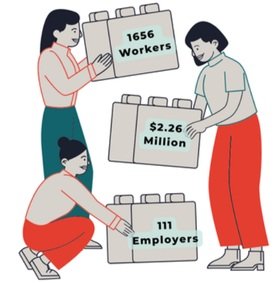NEWS & STORIES

A Season on the Road: Conversations, Connections, and a Clearer Purpose
This fall, the Rhino Foods Foundation team hit the road, traveling to conferences and gatherings across the country — from Oklahoma to Utah, St. Louis to Washington, D.C., and Arkansas to Massachusetts. We engaged with leaders, innovators, and advocates dedicated to designing a more equitable workplace.

Growing Roots in Maine: Income Advance Program Expands Across the State
As we reflect on 2025, it's been a year marked by major momentum for the Income Advance Program, with even more growth on the horizon for 2026. One of the most exciting developments this year has been the continued expansion of the program in Maine.

When Tight Cash Flow Meets Emergency Expenses: Why Credit Cards Aren't the Answer
More than 60% of Americans use credit cards to buy groceries, often with the intention of paying off the balance each cycle. But when you're already managing tight cash flow and an unexpected expense hits—a car repair, medical bill, or broken appliance—what was meant to be temporary quickly becomes a debt spiral under 24% APR.

Industry Ignited Podcast: Spreading the Mission of Innovative Workplace Practices
Our Executive Director, Christina Blunt, and Board Member Justin Worthley sat down with Dr. Leeanne Lowe Aguilar of Industry Ignited for an in-depth conversation about the work we're doing to transform workplaces across the country.

The Numbers are In: 2024 Program Growth
In 2024, the Income Advance Program provided over $2.26 million in loans to 1,656 workers across 111 businesses in New England, offering critical financing that helps working families avoid predatory lending and economic instability.



Treasury's National Strategy for Financial Inclusion: Aligning Workplace Solutions with National Objectives
The U.S. Treasury Department's inaugural National Strategy for Financial Inclusion (NSFI) establishes a framework for expanding access to financial services for underserved communities. With 78% of Americans living paycheck to paycheck and many unable to cover emergency expenses, this strategy provides timely guidance for addressing persistent gaps in financial access.

Access to credit: How the Income Advance Program stacks up
In this blog, we will take a deeper dive into comparing Income Advance to other avenues for accessing cash to address an immediate expense. Our goal here is to show how Income Advance is a non predatory, safe, and accessible solution for employees experiencing financial stress, to ultimately turn into financial empowerment for employees.

Income Advance: The Gold Standard Employer Sponsored Small Dollar Loan Program
Income Advance offers employees quick access to small dollar loans, directly from a bank or credit union. Rather than running a credit check, the key data point used to underwrite Income Advance loans is the borrower’s stable employment – because of this criterion, the loans are often referred to as Employer Sponsored Small Dollar Loans (ESSDL). But not all ESSDLs are created equal.
So what is the “Gold Standard” Income Advance program the RFF advocates for?

Income Advance Reaches 100+ Vermont Businesses: The Demand for Financial Wellness Programs at Work
Since its inception in 2007, the Income Advance program has demonstrated remarkable growth and impact. With 100 businesses in Vermont participating, over $2 million in loans distributed in 2023 alone, and more than 1,400 Vermont workers benefiting, the program's success underscores its importance.

Earned Wage Access and the Income Advance Program: What’s the difference?
At the Rhino Foods Foundation, we get a lot of questions about EWA and how it compares to the Income Advance Program. In this article, we'll delve into expedited pay products (EWA and D2C Advance) and compare them to our Income Advance program. Our aim is to provide readers with a comprehensive understanding to make informed decisions.

Responsive workplace practices begin with listening
Employee engagement and wellbeing are interconnected, with each enhancing the other’s impact on business performance. Foundational to both is trust. So, how do employers build trust to boost employee engagement and wellbeing? By listening, being responsive, and communicating.

RHINO FOODS FOUNDATION RECEIVES $300,000 FROM M&T BANK’S AMPLIFY FUND
Funding will help spread the Income Advance program to ensure that all workers, regardless of their background or financial history, have equitable opportunities to achieve financial stability.

Get to know the newest members of our Board of Directors
We are thrilled to announce our expanded Board of Directors!

Downsize seasonal layoffs, not your team
Guest Blog written by Lauren McBride, Rhino Foods Director of People & Culture
A variety of economic factors drive cycles of layoffs but to the extent that they are predictable – are they also avoidable?

Why investing in employee financial wellness is good business sense
Guest Blog written in partnership with Talent Rewire



